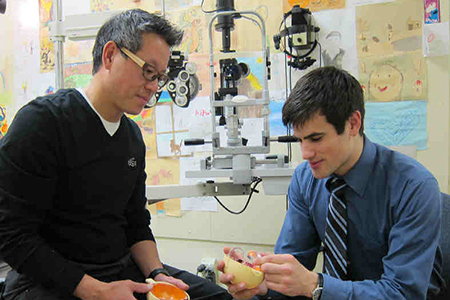Helping others is a calling for many people. Fortunately, caring for people is something that is not just soul-satisfying. Today, careers in health care are also among the fastest growing and highest paying jobs out there.
If you think becoming a Doctor is your only career option in health care, think again. Medicine is just one of many career possibilities that you can explore. Many careers in the health professions require an undergraduate degree as well as an advanced professional degree. But others — like nursing and physician assisting — have more direct paths to starting a career in those fields. When deciding which health career might be the best fi t for you, it’s important to consider how many years of education you’re willing to pursue to meet your goals.
Professional Schools (Medicine Dentistry, Optometry and Pharmacy)
Some health professions such as medicine dentistry optometry and pharmacy require a four-year undergraduate degree followed by admission to a professional school. These health professions also require you to take a licensure test before you’re allowed to practice professionally.
Some colleges offer specialized programs like pre-medicine or predentistry to help prepare students for the requirements needed for professional schools. However there really isn’t a formal pre-med major; you’ll still have to pick a major while making sure you’ve taken the courses required by medical schools (such as a certain number of science courses).
If you want to be a doctor an undergraduate degree plus medical school (to earn a doctorate in medicine better known as a MD) and an internship and residency in a specialty area usually take about 10 to 12 years to complete. Earnings for doctors and surgeons are the highest among all professions although salaries vary by specialty and other factors like geographic location.
If you want to make people happy by giving them healthy and beautiful smiles dentistry might be a good career for you. You’ll need a Doctor of Dental Surgery (DDS) or Doctor of Dental Medicine (DMD). According to the Bureau of Labor Statistics dentists ranked fourth among professions with the highest paying salaries in 2006.
Due to an aging population in need of more prescription drugs there is currently a great demand for pharmacists. Employment of pharmacists is expected to grow by 22 percent between 2006 and 2016. Pharmacists can work in several different settings: retail (such as drug stores like CVS) hospitals and nursing homes and in research. A Doctor in Pharmacy (PharmD) is required for entry into this profession.
Optometrists earn a Doctor of Optometry (OD) and help patients improve vision by prescribing glasses and contacts. They also help prevent eye diseases through early detection in eye exams.
Don’t want to put in the many years it takes to become a doctor or one of these other professionals? Don’t worry — there are still plenty of rewarding health care professions for you to choose from.
Nursing
Nurses constitute the largest segment of health care jobs — they hold approximately 2.5 million jobs. Despite the large number of nurses a nursing shortage is looming. According to a 2008 report entitled “The Future of the Nursing Workforce in the United States: Data Trends and Implications” the shortage of registered nurses (RNs) in the United States could reach as high as 500,000 by 2025.
There are two major paths to becoming a registered nurse: an associate degree program can be completed in two years of fulltime study or a bachelor’s degree program can typically be completed in four years of full-time study. “Both options enable the student to sit for the N-CLEX RN exam,” explains Mary Lou Rusin, professor and chair of the nursing department at Daemen College.
Patricia A. Lange-Otsuka interim dean and professor of nursing at Hawaii Pacific University explains the difference between a LPN and a RN: an LPN or LVN is a licensed practical or vocational nurse who has received one year of formal education in the life and social sciences and has clinical nursing experience. An RN or registered nurse has received two to four years of formal education and has clinical nursing care experience with clients and families across the lifespan.
Not only is nursing a growing field but there is also a need for experienced nurses to teach the next generation of nurses. “All RNs are in demand right now but there is an exceptionally high need for nurse educators — nurses who have a master’s or (preferably) a doctorate degree are eligible for these positions,” Rusin says.
Physician Assistant
Physician assistants (PAs) work in hospitals and doctors’ offices and do many tasks that doctors do (and even prescribe medicine in some states). Instead of attending medical school they attend physician assistant programs at the undergraduate or graduate level and can enter the profession with a bachelor’s or master’s degree.
Gregg Shutts, associate professor and chair of the physician assistant Department at Daemen College points out that PAs with surgical specialties like neurosurgery and orthopedics have especially promising careers. “With an aging population orthopedists and neurosurgeons are in high demand. Just imagine all the degenerative diseases that will affl ict the baby boomers — hip replacements knee replacements laminectomies [spinal surgeries] etc.,” he says.
Physical Therapy
Physical therapists help people regain their mobility after injury through physical rehabilitation. There are two ways to enter the profession: at the master’s level with a master’s degree (MPT MSPT MS) or at the doctoral level with a Doctor of Physical Therapy (DPT) degree.
“Make sure to expose yourself to a variety of practice settings prior to entering a PT program as this will help you get the most out of their schooling,” advises Mary Eastlack, assistant professor of physical therapy and coordinator of admissions at Arcadia University. “Also once you enter a PT program become involved in the ‘business of the profession’ with the American Physical Therapy Association as a student member. Involved students who participate tend to stay up with what is current in the profession and it makes them better therapists going forward in their careers.”
Median Earnings for Health Professions
| Dentist | $136,960 |
| Health Care Administrator | $73,340 |
| Nurse | $52,280 |
| Mental Health Counselor | $34,380 |
| Optometrist | $91,040 |
| Pharmacist | $94,520 |
| Physician Assistant | $80,356 |
| Physical Therapist | $66,200 |
| Anesthesiologist | $259,948 |
| Family Practice Physician | $137,119 |
| General Surgeon | $228,839 |
| Obstetrician/Gynecologist | $203,270 |
| Psychiatrist | $173,922 |
| Psychologist | $59,440 |
| Social Worker | $35,410 |
| *Salaries and job data were obtained from the online version of the U.S. Department of Labor”” Bureau of Labor Statistics Occupational Outlook Handbook (2008-09 edition) at www.bls.gov/OCO/. Salaries vary by specialty and geographic location. |
Health Care Administration
Another career option in health is health care administration. Bachelor’s degree programs in public health and health care administration qualify graduates for entry-level jobs in settings such as state and regional health care agencies” biomedical companies health-education institutions and nonprofit organizations. However many jobs in public health and health care administration require an advanced degree. For example running a health care organization requires a master’s degree in health care administration which is offered through schools of public health medicine allied health public administration and business administration.
Beyond obtaining a master’s degree in health care administration Lange- Otsuka offers this advice for students: “Interview a few administrators whom you admire and get their insights. Then assess what makes those people good administrators and determine if you share these attributes.”
Mental Health
If you are interested in helping people cope with mental health problems then a career as a mental health counselor social worker or psychologist might appeal to you.
Mental health counselors are required to have a master’s degree in counseling. After completing the master’s degree students can take an exam to earn a professional title of Licensed Professional Counselor (LPC) or Licensed Mental Health Counselor (LMHC) (titles vary by state).
To become a social worker you need a bachelor’s degree in social work (BSW) though a master’s degree (MSW) is required for many positions. Social workers often specialize in areas such as children and families or substance abuse; many positions are with local and state agencies.
Of all the mental health fields psychologists need the most training. They must hold a doctorate in psychology (either a Ph.D. or a Psy.D.) and they must complete a one-year internship prior to practicing. Graduate study takes five to seven years to complete.
What to Do if You’re Undecided
If you are curious about a career in the health professions but aren’t sure which career would be ideal for you the best way to figure it out is to “shadow” health care professionals. You can do this by contacting local health care professionals. Tell them you are interested in pursuing their career and ask if you can come to their office and observe their work.
“Students should shadow/observe a professional in the career area of their interest. They need to see what is involved in the specific area of work,” says Alice Sima, director of Pre-Professional Health Programs at Benedictine University.
Mark Sutherland professor of biology at Hendrix College agrees. “It is vital that students get to actually ‘try out’ various vocations through undergraduate research volunteer work shadowing professionals and internships,” he says.
These activities also look good on a resume demonstrating your ongoing interest in a career in health care as you apply for admission into professional graduate schools.
The most important piece of advice for any student considering a career in health care is this according to Sima: “Volunteer in a variety of settings to get used to working with people and understand what it means to communicate and care for another human being.”
Whichever career path you ultimately decide is right for you you can’t go wrong working to help others as a health care professional!
Elaina Loveland is a freelance writer and editor and is the author of two books on colleges and careers.



